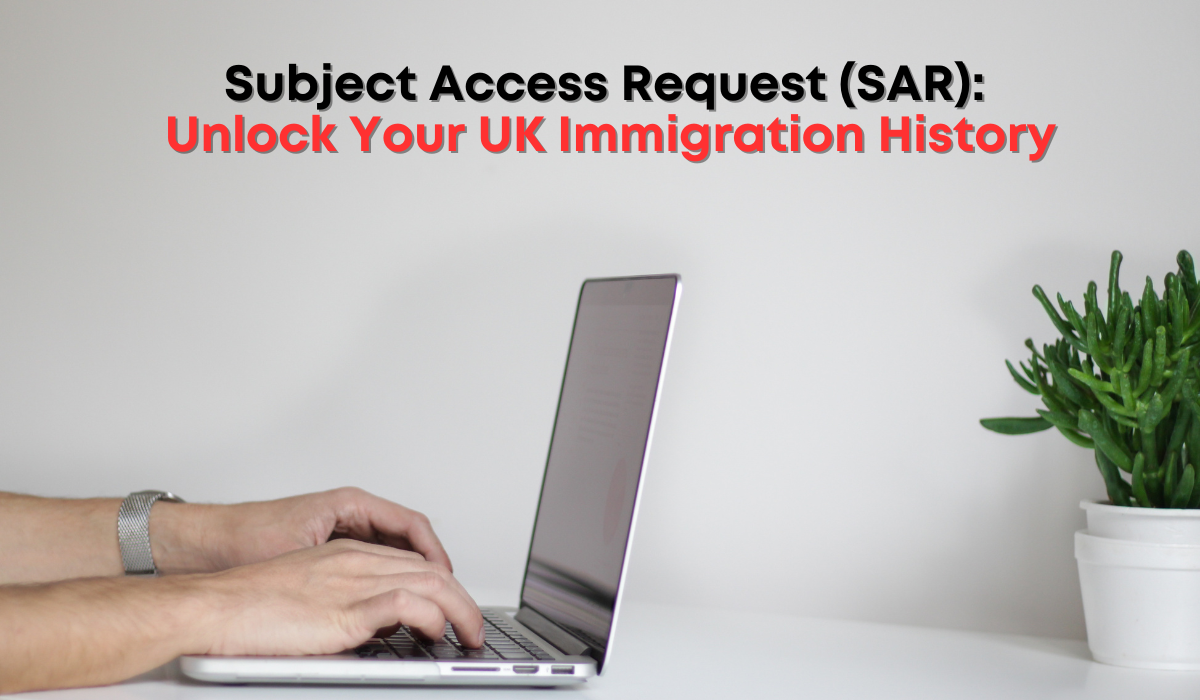On 18th October 2024, the UK Visas and Immigration (UKVI), Border Force, and Immigration Enforcement updated their guidance on requesting personal information held within the borders, immigration, and citizenship system. This important update provides clarity on how individuals can access their immigration records through a Subject Access Request (SAR).
For many navigating the UK immigration system, having access to accurate records is essential, whether it is to support a visa application, verify a period of residency, or challenge a decision. In this article, we explore the types of information available via a SAR, the process for making a request, and the evidence you need to provide.
What is a Subject Access Request (SAR) in Immigration?
A Subject Access Request (SAR) allows individuals to access personal information held about them by UKVI, Border Force, or other related organisations under the Data Protection Act 2018. This legal right ensures transparency and enables individuals to check what data the Home Office has about them.
In the context of immigration, a SAR can provide crucial information such as:
- Details of previous immigration applications, including decisions made.
- Records of entry to and exit from the UK.
- Confirmation of residence length to meet continuous residence requirements for settlement.
This information is particularly valuable when preparing visa applications, responding to immigration queries, or providing evidence for appeals.
Types of Immigration Subject Access Requests
UKVI offers three types of SARs, depending on the depth and specificity of the information required.
- Basic Subject Access Request
A basic SAR provides the following records held since 2000:
- Your immigration history, including application dates and decisions.
- Landing cards.
- Visa applications made outside the UK for entry clearance.
- Worker Registration Scheme (WRS) details for nationals of EU8 countries (e.g., Poland, Latvia, and others).
For most immigration needs, this is sufficient to gather key details for an application.
- Specific Subject Access Request
If particular documents are required, a specific SAR is more appropriate. Applicants can request up to five specific documents, such as:
- A copy of a specific immigration application form.
- Immigration application decision letters.
- Interview records.
- Deportation orders.
- Appeal outcomes.
It is crucial to clearly describe the documents needed to avoid unnecessary delays or receiving incorrect records.
- Detailed Subject Access Request
A detailed SAR is suitable when additional paper records are required beyond what is provided in a basic SAR. For instance, if there are gaps in digital records or missing documents, a detailed request can include:
- Port and Asylum Support records.
- Detention records.
How to Make an Immigration Subject Access Request
The Home Office’s Subject Access Request Unit (SARU) handles all immigration SARs. Here is how you can apply:
For UK-Based Applicants
- Complete the online SAR application form on the Home Office website.
For Overseas Applicants
- Submit the request via email by completing the form and sending it to subjectaccessrequest@homeoffice.gov.uk.
Alternatively, you can send your request by post to:
Subject Access Request Unit (SARU)
2 Ruskin Square
Dingwall Road
Croydon
CR0 2WF
There is no fee for making a SAR.
Supporting Evidence for a SAR
To ensure your SAR is processed efficiently, you must provide the following documents:
- Photo Identification
Examples include a passport, driving licence, biometric residence permit, or national identity card. - Signed Authority
A short, signed letter confirming you wish to access your records. If applying on behalf of someone else, this must include their signed consent. - Proof of Relationship (if applicable)
If applying for a child under 12, provide a birth certificate or proof of parental responsibility.
SARU will not begin processing your request until all required evidence is received.
What Happens After Submitting a SAR?
Once the Home Office receives your SAR and the necessary evidence, they have one month to process your request. Delays may occur if further information is required.
Why a SAR Matters in Immigration Applications
Accessing accurate immigration records can be a game-changer for many applicants. Knowing what data the Home Office holds about you can clarify past immigration activity, identify discrepancies, and provide critical evidence for visa applications, appeals, or citizenship claims.
For example, proving continuous residency is often a complex requirement for settlement applications. A SAR can confirm precise dates of entry and exit, ensuring applicants meet the legal criteria.
Final Thoughts: Ensuring a Smooth SAR Process
Navigating the SAR process can seem daunting, but careful preparation and understanding of the requirements make it manageable. If you are uncertain about which type of SAR to submit or require assistance with your immigration application, it’s advisable to seek legal advice.
At GigaLegal Solicitors, we specialise in UK immigration law and can help you with every aspect of your case, including SARs, visa applications, and appeals. With our extensive knowledge of Home Office procedures, we will ensure your application includes all necessary documents, giving you the best chance of success.
For expert immigration advice, contact our team today. Let us support you in navigating the complexities of UK immigration law with confidence.
Get in touch: For a comprehensive understanding of your options or queries on UK immigration matters, contact GigaLegal Solicitors at 02074067654 or click here to book a no-obligation consultation with an immigration expert.


